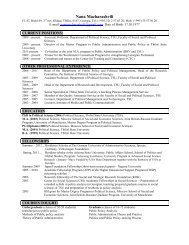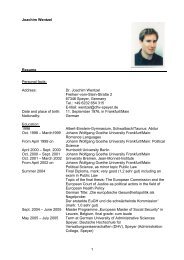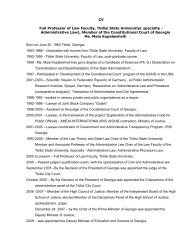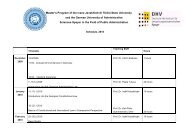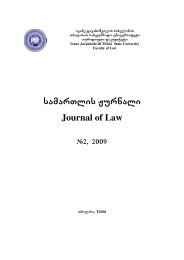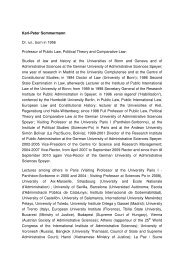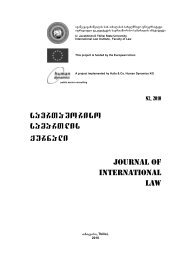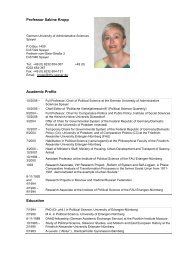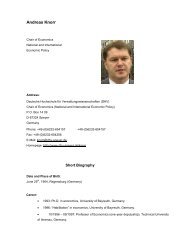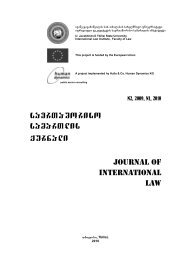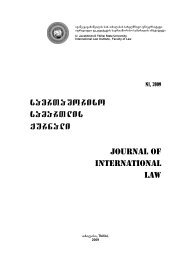Untitled
Untitled
Untitled
You also want an ePaper? Increase the reach of your titles
YUMPU automatically turns print PDFs into web optimized ePapers that Google loves.
saerTaSoriso samarTlis Jurnali, #1, 2008 JOURNAL OF INTERNATIONAL LAW, N1, 2008<br />
As a rule, in a majority of the countries<br />
which have ombudsman’s institution such reports<br />
are submitted to bodies electing or appointing<br />
ombudsman once a year. Public Defender<br />
of Georgia operates on a regulation<br />
which is exception from the general rule. In<br />
1999, when joining Council of Europe, the latter<br />
set as one of the conditions to Georgia’s<br />
membership of the organization to introduce<br />
the following amendments to the Organic Law<br />
on “Public Defender of Georgia”: Public Defender<br />
has to submit reports to the Parliament<br />
not annually, but biannually. The Parliament<br />
of Georgia, accepting the afore-mentioned<br />
requirement of the Council of Europe, amended<br />
the Article 22 paragraph 1 of the Organic<br />
Law on 23 June 1999. The amendment reads<br />
as follows: “Public Defender of Georgia shall<br />
submit a report on situation regarding protection<br />
of human rights and freedoms in the country<br />
to the Parliament of Georgia once in every<br />
six months, in March and October of a calendar<br />
year”.<br />
The foremost purpose of the Report is to<br />
inform the ombudsman’s electing or appointing<br />
body about situation on protection of human<br />
rights and freedoms in a country, identify<br />
legal acts violating human rights and freedoms,<br />
along with submitting the recommendation to<br />
amend or annul them, divulge state bodies and<br />
officials whose actions resulted into violation<br />
of human rights. The level of trust towards the<br />
ombudsman’s institution and growth of its influence<br />
within the wider public largely depends<br />
on facts and comments incorporated into ombudsman’s<br />
report.<br />
Renowned international researcher working<br />
on the topic of ombudsman’s institution Fleiner-Jester<br />
considers that “ombudsman institution<br />
may be ascribed to special institutions of<br />
public law supervision”. At the same time Russian<br />
Professor Boytsova states that “ombudsman,<br />
as a public law institution, serves public<br />
interests; therefore the reports produced by<br />
ombudsman may be considered as public complaints”.<br />
According to the practice established<br />
worldwide, ombudsman actively cooperates<br />
with the media and uses it as a means to influence<br />
the respective bodies in order to restore<br />
rights violated by them, and disclose<br />
gaps identified in activities of the executive<br />
branch of the government. Through relations<br />
with mass media ombudsman provides information<br />
to the society about the work undertaken<br />
and results achieved, which contributes to<br />
strengthen institution’s authority, and its increased<br />
ability to influence over state authorities.<br />
This, ultimately, provides for better possibility<br />
of restoring abused rights of human<br />
beings.<br />
Despite the fact that ombudsmen throughout<br />
the world are committed to reinforce trust<br />
between an individual and administration,<br />
each country has its specificities in relation to<br />
particular goals and objectives, which are identified<br />
by a given ombudsman’s institution.<br />
Ombudsman works in an environment characterizing<br />
and specific only to a given country,<br />
and respectively, the institution’s set-up<br />
and means of operation may differ from a<br />
country to another. This is related with the<br />
specificities of any given state, as well as adjusting<br />
a classical model of ombudsman’s institution<br />
to own, in some occasions to absolutely<br />
unique legal and administrative systems.<br />
This is not surprising, as a country, which introduces<br />
the ombudsman’s institution, tries its<br />
amalgamation into already existing domestic<br />
legal system. This is exactly the reason why<br />
ombudsman institutions, despite the common<br />
features, have their unique specific features<br />
which are prompted by their national traditions,<br />
existing system of control and supervision, distribution<br />
of competences between them, etc.<br />
Ombudsman entered the world institutionalism<br />
as a legislative organ’s entrusted body<br />
to deal with protection of human rights, however<br />
it is not a legislative institution; therefore<br />
stressing its independence in both – theory<br />
and practice is appropriate. It is true that ombudsman<br />
expands and fills in the parliamentary<br />
oversight functions with regard to other<br />
state institutions, however he/she is at the<br />
same time accountable to a legislative organ<br />
along with acting independently, being free<br />
from pressure of any other state body or official.<br />
Ombudsman abides only by law which itself<br />
ascertains ombudsman’s independence<br />
at the normative level, or more specifically,<br />
creates legal basis for such independence.<br />
The fact that this institution does not belong<br />
to any branches of government also reflects<br />
independence of ombudsman. Often degree<br />
186



